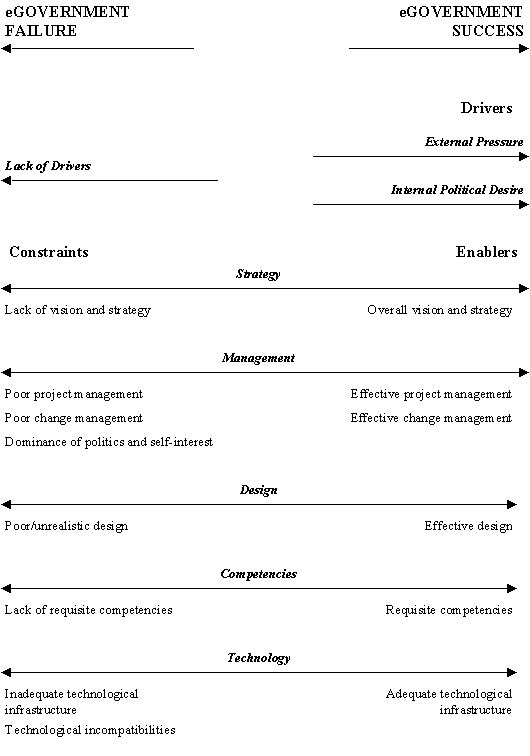In the Evaluation section
Evaluation
Causes of eGovernment Success and Failure: Factor Model
Why do some e-government projects in developing/transitional countries succeed and others fail? This page offers some answers, based on a survey plus case study analysis.
A Factor Model for eGovernment Success and Failure
This model summarises the reasons behind success and failure of e-government projects. Left-pointing items encourage failure; right-pointing items encourage success. The factors are explained in more detail in the tables below.

Critical Success Factors: Why eGovernment Projects Succeed
The table lists and explains some of the main factors that help support success of e-government in developing/transitional countries. Cases in which these factors have been identified are cited in the right-hand column.
Factor |
Explanation |
Examples |
|---|---|---|
External pressure |
Drive for reform from outside government, e.g. from civil society |
|
Internal political desire |
Drive from key government officials for reform and for achievement of e-government goals |
|
Overall vision and strategy |
Overall vision and master plan for good governance and for e-government, identifying 'where we want to get to', seeing IT as the means not the end, and integrating IT with broader reform objectives |
|
Effective project management |
Including clear responsibilities, good planning and consideration of risk, good monitoring and control, good organisation of resources, and well-managed partnerships between public agencies, and public-private |
|
Effective change management |
Including leadership with a project champion, use of incentives to create commitment to and ownership of e-gov project, and stakeholder involvement to build support and minimise resistance |
|
Effective design |
An incremental/piloting approach with feasible objectives and quick, scalable outcomes; participatory involvement of all stakeholders, leading to designs that meet real user needs and match real user contexts |
|
Requisite competencies |
Presence of the necessary skills and knowledge, especially within government itself; need both management and IT skills and knowledge |
|
Adequate technological infrastructure |
For example, encouraged through appropriate telecoms policies |
Other critical success factors identified include: luck, perseverance, and adequate funding.
Critical Failure Factors: Why eGovernment Projects Fail
The table lists and explains some of the main factors underlie failure of e-government in developing/transitional countries. Cases in which these factors have been identified are cited in the right-hand column.
Factor |
Explanation |
Examples |
|---|---|---|
Lack of internal drivers |
Pressures only from IT vendors, with no internal ownership (or understanding of e-gov) |
|
Lack of vision and strategy |
Lack of any long-term view, lack of guidance, and lack of link between ends and means; may be caused by ever-shifting senior staff and/or ever-changing policy and political environment |
|
Poor project management |
Dispersed responsibilities due to multiple ownership of project; absence or weakness of controls; ineffective procurement |
|
Poor change management |
Lack of support from senior officials (causing lack of resource allocation, and negative message to other groups); lack of stakeholder involvement (causing lack of ownership) |
|
Dominance of politics and self-interest |
Focus of key players on personal needs and goals, often related to 'playing politics', with symptoms like infighting, resistance where loss of power is feared, 'me too' copying of e-gov solutions for image purposes, obsession with electoral impacts and short-term kudos, and corruption |
|
Poor/unrealistic design |
Caused particularly by lack of inputs from key local stakeholders, leading to designs that are over-technical, over-ambitious, or mismatched to local environment (culture, values) and needs; occurs particularly where foreign donors, firms and consultants are involved. Other design problems: lack of piloting, lack of fit to organisational structure |
|
Lack of requisite competencies |
Lack of IT knowledge and skills among developers, officials and users/operators; lack of local knowledge among developers |
|
Inadequate technological infrastructure |
Lack of sufficient computers or networks |
|
Technological incompatibilities |
Inability of computerised systems to interchange data |
Taking Action on Success/Failure Factors
Follow this link for further details about actions to take to reduce the risk of e-government failure.
Basis for analysis of factors: synthesis of a) online survey of "e-gov in developing/transitional countries" practitioners and commentators in October 2002 (c.40 responses for failure, c.40 for success); and b) 26 case studies of e-government in developing/transitional economies submitted during September-November 2002 to the eGovernment for Development Information Exchange. Cross-checked with a) categorisation of success/failure factors from study of global e-gov cases in Heeks, R. (2001) Reinventing Government in the Information Age, Routledge, London; and b) summary of e-gov risk factors in Al-Wohaibi, M.A. et al (2002) Fundamental risk factors in deploying IT/IS projects in Omani government organizations, Journal of Global Information Management, 10(4), 1-22.